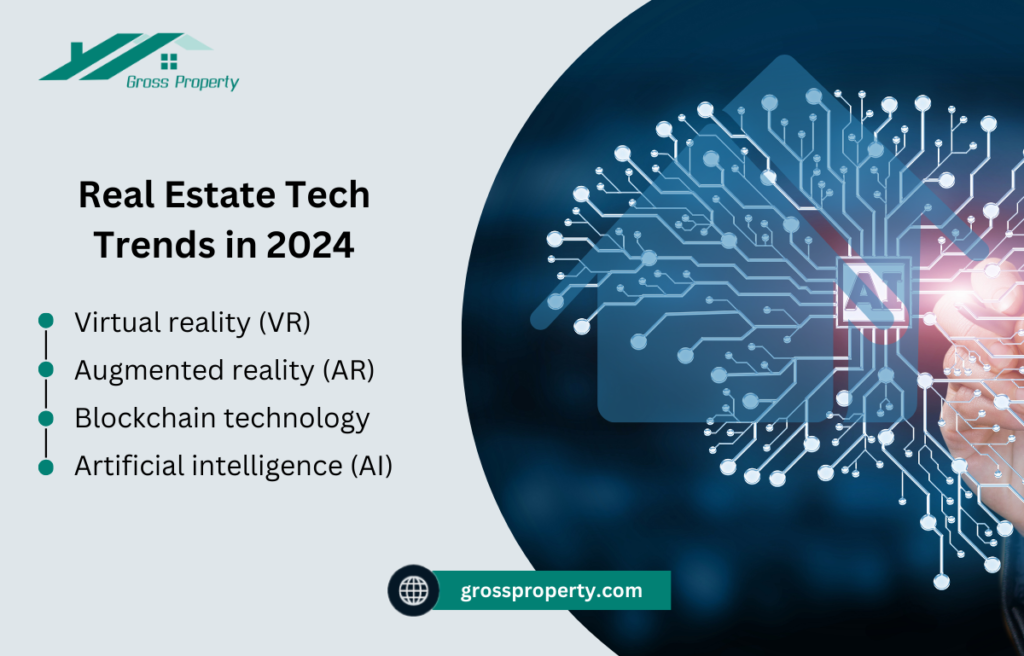The real estate industry is rapidly evolving, with new technologies transforming the way buyers, sellers, and agents interact with properties. From artificial intelligence (AI) to blockchain, the rise of real estate tech trends is driving efficiency, enhancing decision-making, and improving overall user experiences. As the demand for smarter, data-driven solutions grows, the adoption of cutting-edge technologies in real estate is becoming essential for staying competitive in the market. These innovations are not only streamlining traditional processes like property management and sales but are also reshaping the future of how we buy, sell, and manage homes.
This article will explore some of the most important real estate tech trends that are making waves in the industry today, helping professionals and consumers alike navigate the future of real estate with more confidence.
What Are the Top Real Estate Tech Trends in 2024?
In 2024, real estate tech trends are pushing the industry forward by integrating cutting-edge technologies to improve efficiency, transparency, and user experience. One of the most significant trends is the increased use of artificial intelligence (AI). AI-powered tools are streamlining everything from property searches to personalized recommendations, making it easier for buyers and agents to find the right properties based on specific needs. AI also plays a role in automating repetitive tasks such as scheduling and client communication.
Another major trend is the rise of virtual reality (VR) and augmented reality (AR) in real estate. These technologies are revolutionizing property tours, allowing potential buyers to explore homes from anywhere in the world. VR enables immersive, 360-degree property views, providing a realistic experience without physically visiting the property. This trend is particularly beneficial in markets with high demand or international buyers.
Blockchain technology is also emerging as a powerful tool for enhancing transparency and security in real estate transactions. By using blockchain, property records, contracts, and ownership data can be securely stored and transferred, reducing fraud and ensuring all parties have access to trustworthy information.

How Is AI Transforming Real Estate Transactions?
Artificial intelligence (AI) is dramatically changing how real estate transactions are conducted by making the process more efficient and data-driven. One of the key applications of AI is in property valuation. AI algorithms can analyze historical pricing data, neighborhood trends, and even the quality of nearby amenities to provide accurate and up-to-date property appraisals. This helps both buyers and sellers make more informed decisions when negotiating prices.
Additionally, AI-powered chatbots and virtual assistants are transforming customer service in real estate. These tools can handle inquiries from potential buyers or tenants 24/7, answering questions, scheduling viewings, and even providing personalized property recommendations based on user preferences. This level of automation not only saves time but also improves the customer experience by providing immediate and accurate responses.
AI also enhances fraud detection in real estate transactions. By analyzing large datasets and detecting patterns that may indicate fraudulent activity, AI helps protect buyers, sellers, and agents from potential risks. This increased level of security is becoming a crucial component of modern real estate transactions.
What Is the Role of Blockchain in Real Estate?
Blockchain technology is becoming an integral part of real estate, providing enhanced security, transparency, and efficiency. One of the main advantages of blockchain in real estate is its ability to secure property records. Traditionally, property ownership records are maintained by centralized entities, making them vulnerable to manipulation or loss. Blockchain solves this by creating a decentralized, immutable ledger that securely stores ownership information, making it accessible and verifiable by all parties involved.
Smart contracts are another major application of blockchain in real estate. These are self-executing contracts where the terms are directly written into lines of code. In real estate, smart contracts can automate the execution of lease agreements, property sales, and other transactions, ensuring that all conditions are met before the transaction is completed. This reduces the need for intermediaries, speeds up the process, and cuts costs associated with traditional real estate transactions.
Blockchain also enables fractional ownership of real estate, where investors can purchase a portion of a property via tokenization. This opens up real estate investment to a broader audience, including those who may not have the capital to purchase entire properties. The ability to buy and sell real estate tokens on a blockchain marketplace enhances liquidity in what is traditionally an illiquid market.
How Is Virtual Reality (VR) Changing Property Tours?
Virtual reality (VR) is revolutionizing property tours by providing a fully immersive experience that allows potential buyers or renters to explore homes remotely. Instead of relying on static images or scheduled in-person visits, VR technology enables users to virtually walk through properties from anywhere in the world. This is especially beneficial for out-of-town or international buyers who may not be able to physically visit the home before making a decision. With 360-degree virtual tours, buyers can experience every corner of the property, offering a true-to-life view that enhances confidence in the purchasing decision.
Moreover, VR is particularly useful for pre-construction or off-plan properties. Developers can create virtual models of buildings that have not yet been completed, allowing prospective buyers to visualize the final product. This technology reduces the need for costly model homes and provides a more dynamic, engaging way to market new developments.
Additionally, VR tours save time for both buyers and real estate agents. Instead of scheduling multiple property visits, buyers can narrow down their choices through virtual tours and only visit properties that truly meet their needs, making the entire home-buying process more efficient.
What Are the Benefits of Using Big Data in Real Estate?
Big data is transforming the real estate industry by offering deeper insights into market trends, consumer behavior, and property valuations. One of the most significant benefits of big data is the ability to perform predictive analytics. By analyzing large sets of data from various sources, such as historical sales, economic indicators, and demographic trends, real estate professionals can forecast market trends and make better-informed decisions about pricing, development, and investment opportunities. This helps both buyers and sellers position themselves strategically in the market.
Big data also enhances the accuracy of property valuations. Instead of relying solely on traditional appraisal methods, big data algorithms can incorporate factors such as neighborhood growth, school ratings, crime statistics, and even traffic patterns to provide a more comprehensive valuation. This ensures that properties are priced more accurately, benefiting both buyers and sellers.
Furthermore, big data improves targeted marketing in real estate. By analyzing consumer behavior and preferences, agents and property developers can create personalized marketing campaigns that reach the right audience. This reduces marketing costs and increases conversion rates by delivering more relevant content to prospective buyers.
How Does Predictive Analytics Influence Real Estate Investments?
Predictive analytics is revolutionizing real estate investments by providing data-driven insights that help investors make more informed decisions. By analyzing vast datasets, including historical market trends, neighborhood development, and economic factors, predictive analytics tools can forecast future property values and market shifts. This allows investors to identify the best times to buy or sell properties, improving overall investment returns.
Another key influence of predictive analytics is in risk management. Real estate markets can be unpredictable, but predictive models use historical data and current trends to assess potential risks in specific markets or neighborhoods. For example, an investor can use these insights to avoid areas where property values are expected to decline or focus on emerging markets with high growth potential. This data-driven approach reduces the uncertainty traditionally associated with real estate investments.
Additionally, predictive analytics helps investors fine-tune their rental property strategies. By examining tenant behavior, local demand, and rental price trends, investors can set competitive rental rates and minimize vacancy periods. This precision in forecasting helps optimize both short-term cash flow and long-term capital appreciation.
How Are Real Estate Agents Adopting Automation Tools?
Automation tools are being rapidly adopted by real estate agents to streamline workflows, improve efficiency, and enhance client relationships. One of the most common tools is CRM (Customer Relationship Management) software, which helps agents manage their leads, track communications, and automate follow-ups with potential buyers or sellers. By using automation, agents can ensure that no lead falls through the cracks, improving conversion rates and saving valuable time on manual tasks.
Additionally, automation is transforming the way real estate agents handle scheduling and appointments. Tools like automated scheduling systems allow clients to book property viewings online based on real-time availability, without the need for back-and-forth communication. This not only simplifies the process for both parties but also makes agents more accessible, leading to higher customer satisfaction.
Agents are also using automated marketing platforms to enhance their digital presence. These tools can schedule social media posts, send email newsletters, and manage online ad campaigns, ensuring that marketing efforts are consistent and timely. This automation frees up time for agents to focus on building relationships and closing deals while still maintaining a strong digital presence.
What Are the Latest PropTech Tools for Property Management?
In 2024, the latest PropTech tools are transforming property management, making it more efficient and data-driven. One of the most widely adopted tools is property management software that automates tasks such as rent collection, maintenance requests, and tenant communication. Tools like AppFolio and Buildium streamline the day-to-day operations of property management, allowing managers to focus on improving tenant satisfaction and managing portfolios more effectively.
IoT (Internet of Things) devices are also playing a crucial role in property management. Smart sensors can monitor building systems such as HVAC, lighting, and water usage in real-time, allowing for preventive maintenance and reducing energy costs. This proactive approach helps property managers avoid costly repairs and ensures that properties are running efficiently, ultimately improving profitability.
Another exciting trend is the use of virtual property management platforms. These tools allow property managers to oversee multiple properties remotely, using automation and AI-powered insights to handle everything from leasing to maintenance scheduling. As a result, managers can handle larger portfolios with less overhead while providing tenants with faster, more responsive service.
What Role Do IoT Devices Play in Modern Real Estate?
IoT (Internet of Things) devices are becoming integral to modern real estate by enhancing the functionality and value of properties. In residential real estate, IoT devices such as smart thermostats, security systems, and smart lighting offer homeowners greater control over their environments. These devices allow users to monitor and adjust home systems remotely via smartphone apps, improving both convenience and energy efficiency. For example, a smart thermostat can learn a homeowner’s schedule and automatically adjust the temperature, resulting in significant energy savings and increased comfort.
In commercial real estate, IoT is being used to manage building operations more effectively. Sensors installed throughout office buildings or apartment complexes can monitor factors like air quality, energy usage, and occupancy levels. This real-time data allows property managers to optimize building performance, reduce costs, and address maintenance issues before they escalate. IoT devices also improve security by integrating access control systems and surveillance, ensuring that only authorized personnel can enter certain areas.
The use of IoT devices is also influencing property values. Homes and commercial properties equipped with advanced IoT systems are considered more valuable due to their modern features and cost-saving benefits. As buyers increasingly prioritize smart technology, the demand for IoT-enabled properties continues to grow, making them a critical part of the real estate tech trends in 2024.
How Is Real Estate Crowdfunding Evolving With Technology?
Real estate crowdfunding has evolved significantly with the integration of new technologies, making property investment more accessible to a broader audience. Crowdfunding platforms, such as Fundrise and RealtyMogul, allow individuals to invest in real estate properties or developments with lower capital requirements than traditional real estate investments. Technology plays a crucial role in facilitating this by creating user-friendly online platforms where investors can browse opportunities, track performance, and manage their portfolios.
Blockchain technology is also transforming real estate crowdfunding by introducing tokenization. With tokenized real estate, properties are divided into digital tokens that represent ownership shares. Investors can buy and sell these tokens through blockchain-based platforms, providing increased liquidity in what has traditionally been an illiquid market. This also allows fractional ownership, meaning that investors can purchase smaller portions of a property, making real estate investment more flexible and inclusive.
Furthermore, AI-driven algorithms are being used to analyze market data and help investors make smarter decisions. By automating the analysis of market trends, property valuations, and investor behavior, these platforms can offer more targeted investment opportunities. As technology continues to evolve, real estate crowdfunding is becoming more efficient, secure, and attractive to a new generation of investors.
How Is 5G Technology Enhancing Real Estate Operations?
5G technology is revolutionizing real estate operations by providing faster, more reliable connectivity that enhances both the efficiency and experience of property management, sales, and development. One of the primary ways 5G is transforming real estate is through the improved use of smart building technology. With ultra-fast connectivity and lower latency, 5G enables real-time monitoring and control of IoT devices, such as smart thermostats, lighting, and security systems. This level of connectivity allows property managers to optimize building operations more effectively, leading to reduced costs and improved tenant experiences.
Additionally, 5G technology enhances virtual property tours and augmented reality (AR) applications in real estate. With higher bandwidth and faster data transfer, potential buyers can now experience seamless, high-definition virtual tours from anywhere in the world. This makes the home-buying process more accessible and convenient, particularly for remote or international buyers. Developers and agents can also use AR to overlay digital information onto physical spaces, allowing buyers to visualize future modifications or furnishings in real-time.
Moreover, 5G is enabling better data analytics and cloud-based services in real estate. The enhanced connectivity allows for the faster transfer of large data sets, helping real estate professionals analyze market trends, property valuations, and consumer behavior more quickly. This results in more informed decision-making and better-targeted marketing strategies, making 5G a crucial part of the real estate tech trends in 2024.
What Impact Do Smart Homes Have on Real Estate Value?
Smart homes are significantly impacting real estate value by increasing both the desirability and market price of properties equipped with advanced technology. As more buyers prioritize convenience and energy efficiency, homes with smart devices such as automated lighting, thermostats, and security systems tend to sell for a premium. These features not only provide greater control and efficiency but also enhance the overall living experience, making smart homes more attractive to tech-savvy buyers.
Additionally, smart home technology contributes to long-term savings for homeowners, particularly with energy-efficient systems. Smart thermostats, for instance, can optimize heating and cooling, reducing utility bills. As energy costs become a more prominent concern, buyers are willing to pay more for homes that help minimize these expenses, thus driving up the property’s overall value.
In competitive markets, smart homes can also differentiate listings, attracting a larger pool of potential buyers. Properties with integrated smart systems are often seen as more modern and innovative, making them stand out in listings and appealing to buyers looking for turnkey solutions. This increased demand translates directly into higher property values and faster sales.
How Is Cloud Computing Being Used in Real Estate Tech?
Cloud computing is transforming the real estate industry by providing scalable, secure, and efficient solutions for property management, transactions, and data storage. One of the primary ways cloud computing is being used is through real estate management platforms. These cloud-based platforms, such as AppFolio and Propertyware, allow property managers to handle multiple properties from a single interface. With cloud technology, managers can access data, process rent payments, and manage tenant communication remotely, streamlining operations and reducing overhead.
Another significant use of cloud computing in real estate is data storage and analytics. The cloud enables real estate firms to store vast amounts of property data, including transaction histories, market trends, and client information, in a secure and centralized system. This data can then be analyzed in real-time, providing valuable insights that help real estate professionals make informed decisions about property investments, pricing strategies, and market positioning.
Cloud computing also plays a crucial role in collaboration and communication across different teams. For example, real estate agents, brokers, and clients can collaborate on transactions and document sharing via cloud-based tools, allowing for faster and more transparent dealings. This leads to quicker closings and fewer miscommunications, enhancing the overall efficiency of real estate operations.
What Is the Future of Digital Marketing in Real Estate?
The future of digital marketing in real estate is being shaped by emerging technologies and evolving consumer preferences, leading to more targeted, data-driven, and immersive marketing strategies. AI-powered marketing tools are already making a significant impact by automating content creation, optimizing ad campaigns, and analyzing user behavior. These tools help real estate professionals create personalized marketing campaigns that cater to specific buyer personas, increasing engagement and conversion rates.
One of the most promising trends is the rise of video marketing, particularly in the form of virtual tours, drone footage, and 360-degree property walkthroughs. As more buyers search for homes online, video content is becoming a critical part of the decision-making process. In the future, expect to see more real estate listings that incorporate immersive 3D tours and interactive videos, allowing buyers to explore properties from the comfort of their own homes.
Social media platforms will continue to play a pivotal role in real estate marketing, with platforms like Instagram, Facebook, and LinkedIn offering sophisticated targeting tools. These platforms will allow real estate agents and developers to reach specific demographics with highly targeted ads, further refining the digital marketing strategies of the future. As consumers increasingly turn to digital channels for property searches, the focus on mobile-optimized content and SEO-friendly websites will only grow stronger.

How Can Cybersecurity Solutions Protect Real Estate Transactions?
As real estate transactions become more digital, cybersecurity is becoming a critical concern for both buyers and agents. With the increasing use of online platforms for property listings, financial transactions, and document sharing, there are heightened risks of cyberattacks, data breaches, and fraud. One of the most effective cybersecurity solutions in real estate is encryption. Encrypting sensitive data, such as financial details, personal identification, and contract information, ensures that unauthorized parties cannot access it during digital transactions.
Another vital aspect of cybersecurity in real estate is the use of multi-factor authentication (MFA). MFA adds an extra layer of security by requiring users to verify their identity through multiple methods, such as a password and a mobile code. This reduces the risk of unauthorized access to sensitive information, especially during high-stakes transactions such as property purchases or mortgage applications.
Blockchain technology is also emerging as a robust solution for securing real estate transactions. By using decentralized ledgers, blockchain ensures that property records and contracts are tamper-proof and transparent, reducing the likelihood of fraud. Additionally, smart contracts—automated contracts stored on blockchain—are self-executing and enforce the terms of a sale without the need for intermediaries, further enhancing security.
The real estate industry is undergoing a significant transformation, driven by advancements in technology that are reshaping how properties are bought, sold, and managed. From the integration of AI and big data to the rise of 5G, IoT, and blockchain, these innovations are improving efficiency, transparency, and security across the board. As both buyers and agents adopt these tools, the real estate process becomes more streamlined, informed, and accessible, leading to better outcomes for all parties involved.
Looking ahead, the continued evolution of PropTech, coupled with the growing importance of digital marketing and cybersecurity, will further solidify technology’s role in real estate. Whether through more precise investment predictions with predictive analytics, enhanced property management with IoT devices, or securing transactions through blockchain, the real estate industry is set to become more data-driven and secure.
In this rapidly evolving landscape, understanding how these technologies impact every aspect of the market, including down payment options for homebuyers, will be critical. As new tools and trends emerge, staying informed and adaptable will allow buyers, sellers, and real estate professionals to navigate this tech-driven future successfully.











